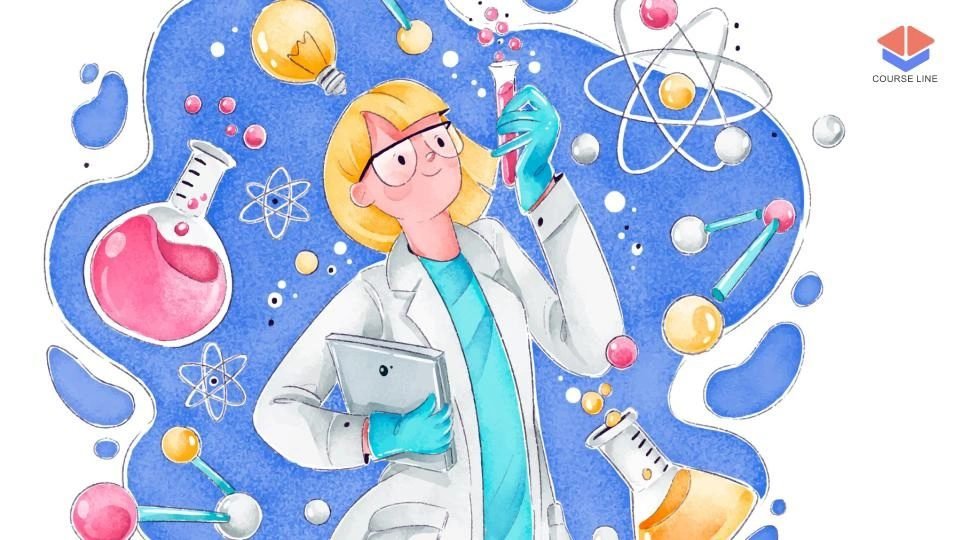Course Features
Price
Study Method
Online | Self-paced
Course Format
Reading Material - PDF, article
Duration
7 hours, 45 minutes
Qualification
No formal qualification
Certificate
At completion
Additional info
Coming soon
- Share
Overview
This GCSE Chemistry curriculum offers a detailed exploration of the building blocks of matter and the principles governing chemical interactions. Through a carefully structured series of lectures and lessons, students gain the essential knowledge required to excel in the GCSE Chemistry examination while developing scientific thinking and analytical skills that go beyond the classroom.
The course begins with an introduction to chemistry, the scientific method, and the fundamental properties of matter, ensuring students develop a solid grasp of core concepts. Learners then delve into atomic structure, the periodic table, isotopes, and the nature of chemical bonding. Practical understanding is strengthened through lessons on chemical reactions, balancing equations, and identifying acids, bases, and salts.
As the course progresses, students explore advanced topics such as stoichiometry, chemical quantities, reaction rates, and equilibrium. Lessons on organic chemistry provide insights into hydrocarbons, functional groups, and common organic reactions. The course also highlights the importance of chemistry in solving global challenges, including climate change, pollution, and sustainable resource management.
In addition to theoretical knowledge, students develop hands-on lab skills in the Practical Chemistry module, where they learn experimental design, data interpretation, and lab safety. The final module supports exam success through targeted revision strategies, past paper practice, and effective study techniques tailored to GCSE assessment standards.
Who is this course for?
This GCSE Chemistry curriculum offers a detailed exploration of the building blocks of matter and the principles governing chemical interactions. Through a carefully structured series of lectures and lessons, students gain the essential knowledge required to excel in the GCSE Chemistry examination while developing scientific thinking and analytical skills that go beyond the classroom.
The course begins with an introduction to chemistry, the scientific method, and the fundamental properties of matter, ensuring students develop a solid grasp of core concepts. Learners then delve into atomic structure, the periodic table, isotopes, and the nature of chemical bonding. Practical understanding is strengthened through lessons on chemical reactions, balancing equations, and identifying acids, bases, and salts.
As the course progresses, students explore advanced topics such as stoichiometry, chemical quantities, reaction rates, and equilibrium. Lessons on organic chemistry provide insights into hydrocarbons, functional groups, and common organic reactions. The course also highlights the importance of chemistry in solving global challenges, including climate change, pollution, and sustainable resource management.
In addition to theoretical knowledge, students develop hands-on lab skills in the Practical Chemistry module, where they learn experimental design, data interpretation, and lab safety. The final module supports exam success through targeted revision strategies, past paper practice, and effective study techniques tailored to GCSE assessment standards.
Requirements
This GCSE Chemistry curriculum offers a detailed exploration of the building blocks of matter and the principles governing chemical interactions. Through a carefully structured series of lectures and lessons, students gain the essential knowledge required to excel in the GCSE Chemistry examination while developing scientific thinking and analytical skills that go beyond the classroom.
The course begins with an introduction to chemistry, the scientific method, and the fundamental properties of matter, ensuring students develop a solid grasp of core concepts. Learners then delve into atomic structure, the periodic table, isotopes, and the nature of chemical bonding. Practical understanding is strengthened through lessons on chemical reactions, balancing equations, and identifying acids, bases, and salts.
As the course progresses, students explore advanced topics such as stoichiometry, chemical quantities, reaction rates, and equilibrium. Lessons on organic chemistry provide insights into hydrocarbons, functional groups, and common organic reactions. The course also highlights the importance of chemistry in solving global challenges, including climate change, pollution, and sustainable resource management.
In addition to theoretical knowledge, students develop hands-on lab skills in the Practical Chemistry module, where they learn experimental design, data interpretation, and lab safety. The final module supports exam success through targeted revision strategies, past paper practice, and effective study techniques tailored to GCSE assessment standards.
Career path
This GCSE Chemistry curriculum offers a detailed exploration of the building blocks of matter and the principles governing chemical interactions. Through a carefully structured series of lectures and lessons, students gain the essential knowledge required to excel in the GCSE Chemistry examination while developing scientific thinking and analytical skills that go beyond the classroom.
The course begins with an introduction to chemistry, the scientific method, and the fundamental properties of matter, ensuring students develop a solid grasp of core concepts. Learners then delve into atomic structure, the periodic table, isotopes, and the nature of chemical bonding. Practical understanding is strengthened through lessons on chemical reactions, balancing equations, and identifying acids, bases, and salts.
As the course progresses, students explore advanced topics such as stoichiometry, chemical quantities, reaction rates, and equilibrium. Lessons on organic chemistry provide insights into hydrocarbons, functional groups, and common organic reactions. The course also highlights the importance of chemistry in solving global challenges, including climate change, pollution, and sustainable resource management.
In addition to theoretical knowledge, students develop hands-on lab skills in the Practical Chemistry module, where they learn experimental design, data interpretation, and lab safety. The final module supports exam success through targeted revision strategies, past paper practice, and effective study techniques tailored to GCSE assessment standards.
-
- What is Chemistry? 00:10:00
- The Scientific Method 00:10:00
- Matter and its Properties 00:10:00
- Elements, Compounds, and Mixtures 00:10:00
-
- The Structure of the Atom 00:10:00
- Atomic Number and Mass 00:10:00
- Isotopes and Radioactivity 00:10:00
- The Periodic Table 00:10:00
- Types of Chemical Bonds 00:10:00
- Chemical Formulas and Equations 00:10:00
- Chemical Reactions and Balancing Equations 00:10:00
- Acids and Bases 00:10:00
- Mole Concept 00:10:00
- Stoichiometry 00:10:00
- Percent Composition and Empirical Formulas 00:10:00
- Chemical Quantities and Limiting Reagents 00:10:00
- Introduction to Organic Compounds 00:10:00
- Hydrocarbons and Functional Groups 00:10:00
- Naming Organic Compounds 00:10:00
- Organic Reactions 00:10:00
- Laboratory Safety and Techniques 00:10:00
- Experimental Design and Data Analysis 00:10:00
- Common Laboratory Experiments 00:10:00
- Writing Lab Reports 00:10:00
- Exam of GCSE Chemistry 00:50:00

No Reviews found for this course.
Is this certificate recognized?
Yes, our premium certificate and transcript are widely recognized and accepted by embassies worldwide, particularly by the UK embassy. This adds credibility to your qualification and enhances its value for professional and academic purposes.
I am a beginner. Is this course suitable for me?
Yes, this course is designed for learners of all levels, including beginners. The content is structured to provide step-by-step guidance, ensuring that even those with no prior experience can follow along and gain valuable knowledge.
I am a professional. Is this course suitable for me?
Yes, professionals will also benefit from this course. It covers advanced concepts, practical applications, and industry insights that can help enhance existing skills and knowledge. Whether you are looking to refine your expertise or expand your qualifications, this course provides valuable learning.
Does this course have an expiry date?
No, you have lifetime access to the course. Once enrolled, you can revisit the materials at any time as long as the course remains available. Additionally, we regularly update our content to ensure it stays relevant and up to date.
How do I claim my free certificate?
I trust you’re in good health. Your free certificate can be located in the Achievement section. The option to purchase a CPD certificate is available but entirely optional, and you may choose to skip it. Please be aware that it’s crucial to click the “Complete” button to ensure the certificate is generated, as this process is entirely automated.
Does this course have assessments and assignments?
Yes, the course includes both assessments and assignments. Your final marks will be determined by a combination of 20% from assignments and 80% from assessments. These evaluations are designed to test your understanding and ensure you have grasped the key concepts effectively.
Is this course accredited?
We are a recognized course provider with CPD, UKRLP, and AOHT membership. The logos of these accreditation bodies will be featured on your premium certificate and transcript, ensuring credibility and professional recognition.
Will I receive a certificate upon completion?
Yes, you will receive a free digital certificate automatically once you complete the course. If you would like a premium CPD-accredited certificate, either in digital or physical format, you can upgrade for a small fee.
Course Features
Price
Study Method
Online | Self-paced
Course Format
Reading Material - PDF, article
Duration
7 hours, 45 minutes
Qualification
No formal qualification
Certificate
At completion
Additional info
Coming soon
- Share
Audio Typing Level 5 Advanced Diploma
Course Line237£490.00Original price was: £490.00.£14.99Current price is: £14.99.Network Protocols and Architecture Level 3 Advanced Diploma
Course Line239£490.00Original price was: £490.00.£14.99Current price is: £14.99.GDPR Level 8 Advanced Diploma
Course Line238£490.00Original price was: £490.00.£14.99Current price is: £14.99.





